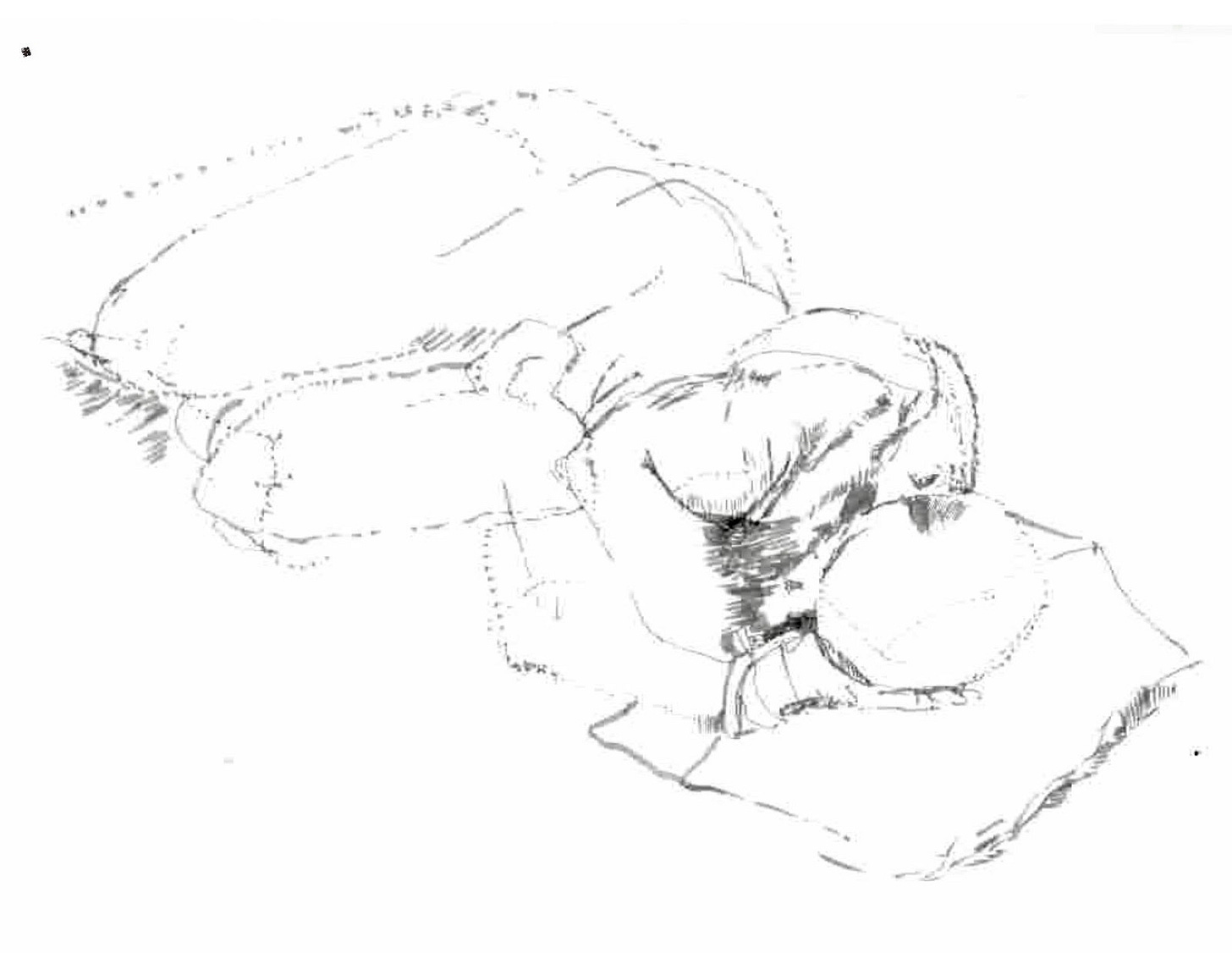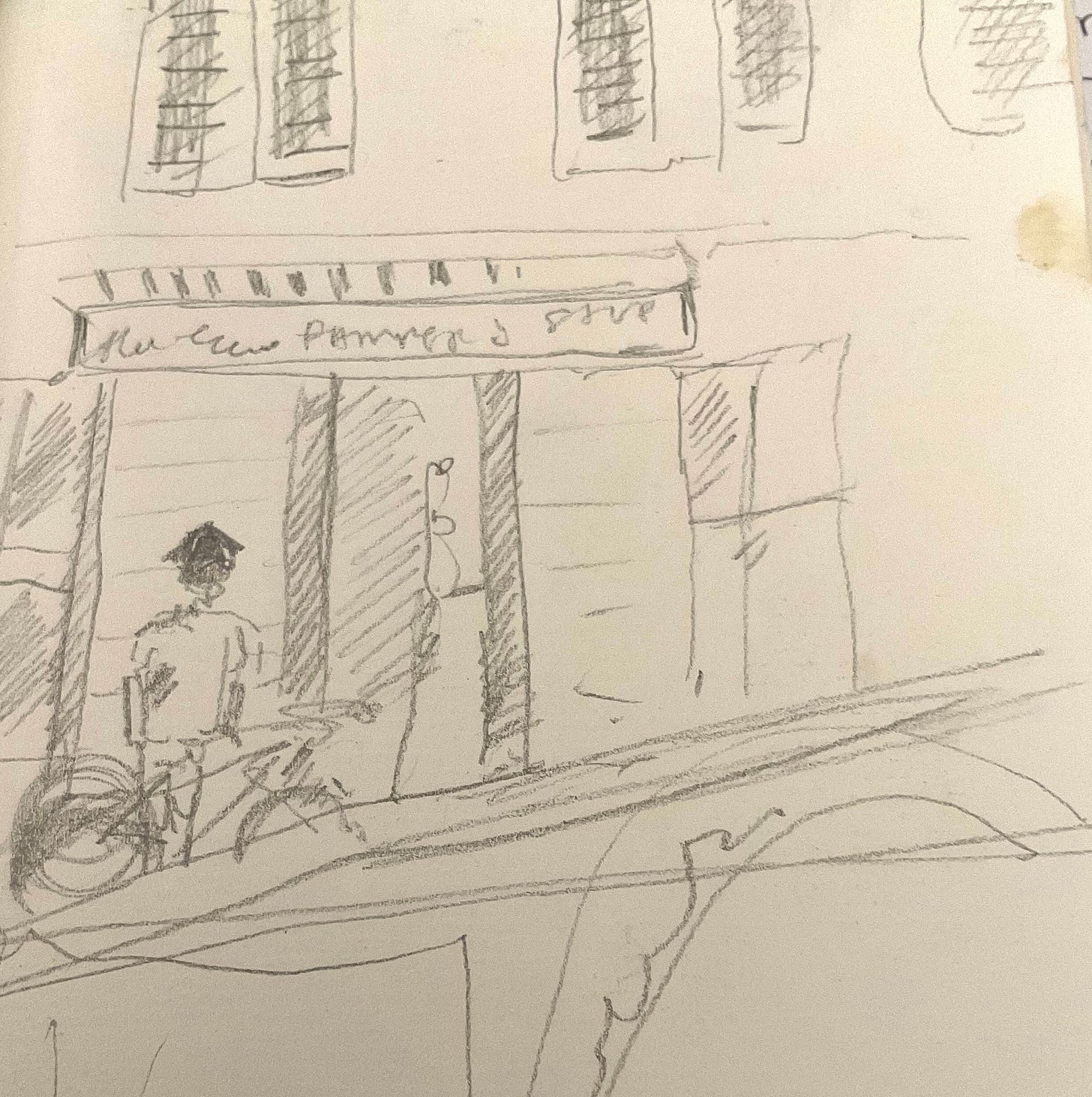Dear Friend,
I hope you had a good weekend.
Thank you to those who kindly wrote to me to sympathise and encourage me about my quest to finally get a driving licence.
A wonderful Pen Friend named Mary Cameron, who lives in Brittany, wrote me this fine note:
“I just got my French licence (at 68) after two tests and oodles of lessons with a gorgeous monitrice who plied me with Bach Flower remedies and croissants. You can do it!
Aurélie's (my monitrice) best tip was ’to keep a long, soft gaze into the middle distance’.
If you do this, then somehow, magically, the car just positions itself correctly on the road.
In any case, 'a long soft gaze' seems like pretty good advice for life as well as driving”
I really like this image.
I decided, in part after feedback from readers of this letter, that a new driving instructor ought to be found. So I am in the process of signing up for another school and you can rest assured that I will be keeping you updated.
On the subject of a long, soft gaze, recently I’ve been offering myself the great gift of turning off my iPhone for several hours. It has been magical. The deeper recesses of my brain slowly wake up from their slumber; I feel almost like I have some kind of superpower of concentration.
Recently I had a video call with my uncle, who uses his phone only when he needs it and has never been known to scroll aimlessly. I was explaining how much clearer-minded I felt not just putting my phone away, but having it off completely, so it won’t draw me in. As I spoke, I could see the faint alarm in his eyes and I was aware that I sounded like an addict.
In some sense, I think people like me who grew up in the Nineties have the most tortured relationship with technology because we have come of age during the period where computers went from a curious portal to visit from time to time, to a constant squalling companion.
My feeling is that the people who grew up ten years laters, today’s young adults, have a more intentional and less headless-chicken relationship with always-on technology by necessity, because it has always been in their lives. I recently had a coup de vieux, as the French call it, or a sudden feeling of being old, when I saw a teenager on the train in front of me texting predicatively with one thumb, while I use at least two thumbs and type ponderously letter by letter.
Anyway, continuing the human condition/ inexorable march of time theme, taking time away from my phone always makes me think of one particular essay by Zadie Smith from her collection, Feel Free. I have written about her ideas on technology more than once in these letters, but I do think they bear repeating.
In the piece of writing in question, Smith describes the internal process that led to her decision not carry a smartphone. The essay is called Man versus Corpse and it is illustrated with a Renaissance drawing named Man Carrying Corpse on His Shoulders by Luca Signorelli. In her words, “the drawing represents an absolute certainty about you, namely, that you will one day be a corpse.”
She goes on to link the dissonant feeling of mortality brought about by this painting with the time she had been spending scrolling aimlessly on her phone at night. She introspects:
“…if I truly believed that being a corpse was not only a possible future but my only guaranteed future — I’d do all kinds of things differently. I’d get rid of my iPhone, for starters .”
She goes on to touch on how different artists deal in death, from the abstraction of Rothko to the candy-coloured nihilism of Warhol, which is referenced in the passage below.
“Rothko wanted us deeply affected by the thing we don’t want to look at. But there exists another solution to our tendency towards illusion: affectlessness. Make the viewer feel like a corpse. For when images proliferate among themselves, as if running mechanically with no human involvement, the viewer will find he lacks a natural point of entry.”
The strength of Smith’s essay on technology and mortality actually convinced me to get rid of my iPhone several years ago, when I first read Feel Free. I didn’t eschew pocket-size computers altogether, but bought a much less sexy-to-use Android phone and used it only minimally. It was very good. I read more, thought more, moved more and lived more courageously. (I was also super-productive for my clients, helped hugely by the fact that I wasn’t constantly slipping off on a snail trail to nowhere.)
Then I re-bought an iPhone, my reason, at least I told myself, was to capture good photos when I travel. Then the pandemic began and I lost some buoyancy in my life and discarded my existential commitment altogether. Today, I even wear an Apple Watch, an ostensibly ridiculous step I swore I would never take.
While this new approach of turning off my phone altogether is perhaps an extreme behaviour that indicates a lack of control on my part, it does seem to open new (old?) doors for me to do so.
Something about constantly being confronted by a profusion of images and news of others quashes my urge to make anything. I find myself thinking that there’s so much stuff out there, what is the point of adding another piece of detritus to the hurricane?
Once I’m far from the digital madding crowd, I do indeed feel freer again.
Now THAT’S real life
Last Saturday I went for a long walk, what the French call a randonné, in the close countryside to the southwest of Paris. For the second time in a month, I almost missed my train to get out to a randonné because I had spent too much time buying food for the picnic element. I believe this is a sign that I have been living in France too long and now consider food to be important above all else.
On Saturday I really outdid myself spending maybe one hour selecting the most delicious sharing snacks from the market (baguettes, spiced olives, aubergine dip, houmous, apricots, apples). The idea was that I would pick up the provisions and meet my partner and our friends at the station with our dog, Babbet. I maintain and will use this letter to say for the record, that he told me we were meeting at 10.30, not that the train was leaving at 10.30.
Well, at 10.25 I was on the other side of the huge Montparnasse station. "We are leaving, you will have to get the next train,” was the message I received by text, which I took as a personal affront and a challenge. With my dog attached to me with a wraparound lead and my extensive picnic in my backpack, I ran from the mouth of Montparnasse Metro to the overground station, about 400 metres away, then sprinted up the escalator and to the gate. I jumped on the train just before the doors closed, picnic intact.
The high-octane moments were soon forgotten when we arrived at our destination. Getting off the train at a suburb called La Verrière, we headed into the rolling countryside of Ile-de-France. We went through forest and sweet bucolic streets with cottages covered in rose-covered trellises and flanked by neat rows or irises. We stopped for a picnic in a clearing where I unloaded my delay-making provisions which, may I say, were very much appreciated.
Later we stopped in the village of Saint-Forget, which looked like something from another era and another world from Paris with its leisurely café-terraces and sleepy village shop. Passing various châteaux along the way — as well as a charming cast of horses, donkeys, cows and sheep — we finished our route in the village of Chevreuse along a narrow canal dotted with 22 mini bridges, attached to houses that were once part of a thriving goat-hide tanning industry. The last stop on the walk was the Ferme de Coubertin, a dairy farm where we picked up raw milk, yoghurt and various kinds of cheese.
Whenever I come back from a more rural place to the madding crowd of Paris, I always think of the words of my friend Rosie’s six-year-old daughter Céleste. Once when they arrived back in a bustling and stressed Gare de Lyon after a week spent in the countryside, Céleste turned to her mother and said:
FR: “Alors ça c’est la vraie vie !”
EN: “Now THAT’S real life!”
Thirty-second book club
This week I read Why we Travel by fellow travel writer Ash Bhardwaj. I first met Ash when I interviewed him as part of his work filming and producing epic walks in intrepid places with TV explorer Levison Wood. Many years later, we hosted Ash and his lovely sister Charlotte for a night out in Paris in one of our locals, CO Paris 18, an offbeat bar run by the wonderfully eccentric Isabelle, who often sports a red chef’s hat for no clear reason and also sells caviar on the side. There is a jazz night there once a week which in the summer spills out onto the street. We went there with Ash and Charlotte and got chatting to a host of local characters, including a man called Franck, who I can only describe as the self-elected president of Montmartre. The tale of this evening makes it into the book as an example of how even apparently touristy areas can be full of surprises if you know where to look. Anyway, overall it’s an engaging and thought-provoking book which looks at the philosophical reasons that motivate us to travel by choice, rather than necessity; what we are looking for and how we might hope to find it. It’s interspersed with the story of Ash’s own life, which was transformed by going to new places and meeting different people, yet also anchored by his mother, who he writes about so movingly that I cried on the bus when I read the last chapter of this book. I recommend it!
As well as preparing gourmet picnics and contemplating the futility of our paltry human existence, I’v e also been busy writing a few different articles.
You may be interested in all or any of the below:
NB: If you find yourself shut out by a pay/registration wall and want to read any of the above, send me an email. I’ve bootleg PDFs to spare!
Thank you for reading until the end. Thank you also to those who have recently become my paying Friends. If you have the means and inclination, please do consider signing up to sponsor the letters. In return, you will receive a hand-drawn card in the post.
Have a lovely week!
Yours,
Hannah




Hello Hannah
Thank you so much for the mention and the gorgeous drawing. She has found a home on my desk between the rabbit pencil sharpener and the roses. Thank you also for connecting me to MFK Fisher whose writing I am currently devouring with something akin to the gusto and wonderment with which she wrote, lived, cooked and ate. You are a source of many fine good things!
Bien cordialement
M